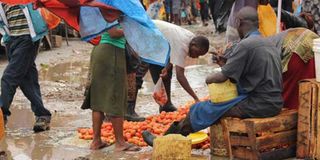Cholera death toll rises to 52 as disease spread by poor hygiene hits 10 counties

A trader sits and displays his tomatoes right in the middle of a flooded area at the Kongowea Market in Mombasa. Cases of cholera have been reported in 10 counties including Mombasa, Nairobi and Nakuru. PHOTO | WACHIRA MWANGI | NATION MEDIA GROUP
What you need to know:
- A 35-year-old man and a woman aged 55 were also admitted to Kimbimbi Sub-County hospital in Kirinyaga County.
- At the weekend, a man aged about 60 and an eight-year-old girl died within three days of each other in Gikuru and Kakawa villages after exhibiting cholera-like symptoms.
- In Thika, four people have died of cholera while 12 others are being treated.
- Other cases have been reported in Kabati area of Murang’a County where at least six people have died.
Hawking of food has been banned in Embu after two people died of what is suspected to be cholera in two villages in Mbeere South Sub-County.
The disease caused by poor sanitation and hygiene has spread to 10 counties, with over 2,000 cases diagnosed since the first outbreak was reported in December.
At the weekend, a man aged about 60 and an eight-year-old girl died within three days of each other in Gikuru and Kakawa villages after exhibiting cholera-like symptoms.
A 35-year-old man and a woman aged 55 were also admitted to Kimbimbi Sub-County hospital in Kirinyaga County, while an 11-year old girl was Sunday recovering at Gategi Health Centre in Mbeere South.
Results from samples sent to the national public health laboratory are expected today to establish whether the two are ailing from cholera or acute typhoid.
“The situation is manageable and we are coping well. We are educating people on the right hygiene to minimise such cases,” said Dr Philip Masaulo, the Embu County director of health.
He said health workers had increased surveillance and medicine had been sent to various health centres in anticipation of increased cases of cholera. He asked families to also boil drinking water.
STOP EATING IN GATHERINGS
“We urge people to stop eating in mass gatherings such as funerals and weddings.
"We are also asking neighbouring counties to follow suit because it is a shared problem,” said Dr Masaulo.
In Meru, the county government said it would work with other counties to curb the spread of cholera in the region.
The county executive for Health, Dr William Muraah, said the neighbouring Embu and Tharaka-Nithi counties had been singled out in the collaboration to undertake preventive and curative measures to stop the spread of the disease.
“I have already instructed the public health officers to crack down on all unclean restaurants, food kiosks and food hawkers.
"We also have enough medical supplies to deal with any eventuality, even in the neighbouring counties,” he said.
More than 60 eateries have been closed for failing to meet health standards while the county government has started a campaign in schools to spread information about how to stop the disease, including boiling drinking water, washing hands with soap and clean running water and not buying food from hawkers.
FOUR DIE IN THIKA
In Thika, four people have died of cholera while 12 others are being treated.
The county executive for health, Dr Jonah Mwangi, said the four died in their homes at Kiandutu and Gachagi slums.
“We have identified one positive case for cholera who is undergoing treatment at Thika Level 5 hospital, while 12 others who have diarrhoea have also been admitted and are being monitored,” he said during a free cancer screening at the Thika Muslim Primary School.
He said the county had banned hawking of food, including roasted maize.
Other cases have been reported in Kabati area of Murang’a County where at least six people have died.
In Migori, health officials are still on high alert despite a reduction in new cholera cases in the county which was the hardest hit by the disease.
Ten people died in the region from the disease in February and March.
“Our teams are still on red alert because we are still getting reports of outbreaks in Nakuru, Mombasa and Nairobi,” said Dr Donald Jaleny, the county health department’s chief officer.
The outbreak occurred during a prolonged drought, which caused a water shortage.
Health workers managed to contain the disease due to quick supply of drugs and water treatment tablets beside outlawing eating in funerals and other public gatherings.
“All our ward and sub-county administrators were under firm instructions to ensure no feasting took place in the villages until the time the ban was lifted,” said Mr Elijah Odhiambo, the county executive committee member in charge of health.
The county also banned hawking of ready-to-eat food although many traders defied the ban.
Mobile treatment units were set up, especially on the boundary with Homa Bay while others were set up in churches.
The Kenya Red Cross Society attributed the rapid spread of the disease to contamination of River Riana and poor hygiene, especially among families that do not use toilets.
Reported by Charles Wanyoro, Kennedy Kimanthi, David Muchui and Elisha Otieno




